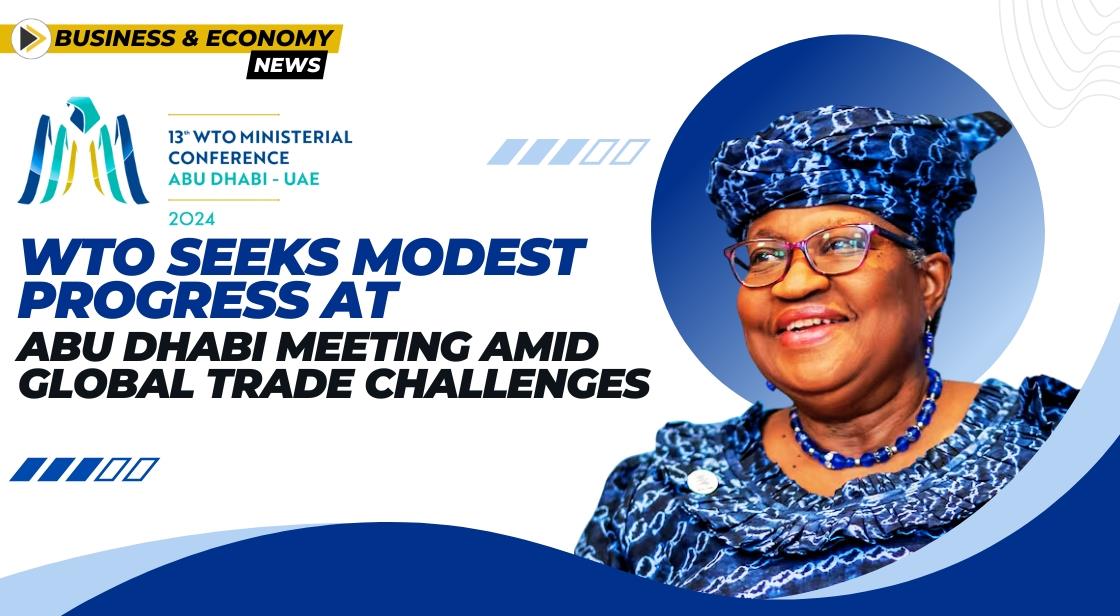WTO Seeks Modest Progress at Abu Dhabi Meeting Amid Global Trade Challenges

News Synopsis
Trade ministers from across the globe convened in Abu Dhabi for a World Trade Organization (WTO) meeting, aiming to establish new global trade rules. The WTO, a linchpin for 75% of global commerce, faces challenges as the world economy shows signs of fragmentation.
WTO Director-General Ngozi Okonjo-Iweala tempered expectations, acknowledging the complexities in today's geopolitical landscape. Despite describing the atmosphere as "tougher" than the last meeting in 2022, Okonjo-Iweala urged ministers to engage in negotiations.
While she ruled out an immediate deal on reforming the WTO's appeals court, there is optimism for agreements on global fishery regulations and the accession of new members. However, contentious issues such as digital trade tariffs and agricultural trade rules pose significant challenges.
Global Trade Landscape at a Critical Juncture
In her opening speech, WTO Director-General Ngozi Okonjo-Iweala highlighted the difficulties faced by the WTO, emphasizing the need for concerted efforts in negotiations. The current global economic scenario, marked by wars, tensions, and elections, adds complexity to the trade discussions. The meeting in Abu Dhabi is seen as a critical juncture for the multilateral trading system, with challenges including unilateralism, protectionism, and discrimination.
Key Agendas and Challenges
-
Fisheries and Development: Negotiators express hope for an agreement on global fishery regulations, a crucial step in protecting fish stocks and fishermen by curbing government subsidies. Additionally, around 120 countries are expected to reach a deal to remove investment barriers that hinder development.
-
Digital Trade and Tariffs: Challenges persist in extending a 25-year moratorium on applying tariffs to digital trade. Disagreements, particularly from South Africa and India, complicate discussions on this issue.
-
Agricultural Trade Rules: A longstanding challenge, negotiators grapple with reaching an agreement on agriculture trade rules. This complex issue has evaded resolution for decades.
UAE's Support and Initiatives
The UAE, hosting the conference, announced a $10 million grant to support WTO initiatives, including the Fisheries Funding Mechanism, the Enhanced Integrated Framework (EIF), and the Women Exporters in the Digital Economy (WEIDE) Fund. Trade and sustainability are emphasized to ensure the WTO's relevance in addressing contemporary global challenges.
Director-General's Role and Optimism
Ngozi Okonjo-Iweala's proactive approach and the results-oriented stance of the UAE trade minister provide optimism amid the challenges. The determination of the director-general, showcased in previous marathon negotiations, contributes to the hopes for positive outcomes.
Negotiations in a Difficult Landscape
Okonjo-Iweala described the current climate as "tougher" than the 2022 meeting, citing various factors:
-
Geopolitical tensions and conflicts: Ongoing global conflicts and political unrest add complexity to the trade landscape.
-
Economic slowdown: Trade growth is expected to fall short of the WTO's initial estimates.
-
Upcoming elections: National elections in key member countries may influence trade policies.
Despite these challenges, Okonjo-Iweala urged ministers to "roll up their sleeves" and continue negotiations. However, she downplayed the possibility of a deal in Abu Dhabi regarding the WTO's appeals court reform.
Potential Areas of Progress
While some major agreements seem unlikely, there are areas where progress might be possible:
-
Fisheries subsidies: Negotiators remain hopeful for an agreement banning harmful government subsidies that contribute to overfishing, potentially benefiting global fish stocks and fishermen.
-
New members: The accession of Comoros and East Timor to the WTO could be finalized.
-
Investment barriers: A group of around 120 countries might reach an agreement on removing investment barriers that hinder development.
You May Like









